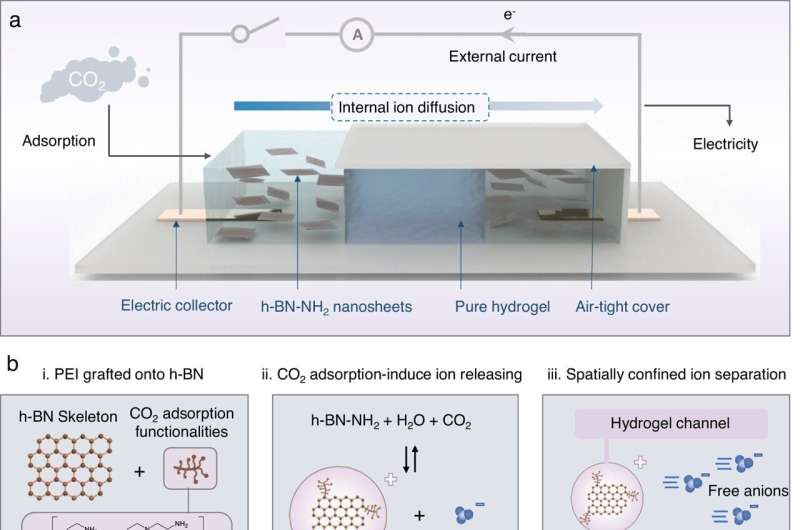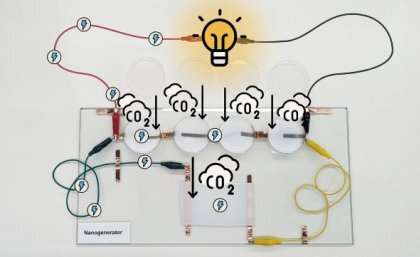
University of Queensland researchers have built a generator that absorbs carbon dioxide (CO2) to make electricity.
Dr. Zhuyuan Wang from UQ's Dow Center for Sustainable Engineering Innovation says the small, proof-of-concept nanogenerator is carbon negative because it consumes the greenhouse gas. The paper is published in the journal Nature Communications.
"This nanogenerator is made of two components: a polyamine gel that is already used by industry to absorb CO2 and a skeleton a few atoms thick of boron nitrate that generates positive and negative ions," Dr. Wang said.
"We've worked out how to make the positive ions much larger than the negative ions and because the different sizes move at different speeds, they generate a diffusion current which can be amplified into electricity to power light bulbs or any electronic device.
"In nature and in the human body, ion transportation is the most efficient energy conversion—more efficient than electron transportation which is used in the power network."
The two components were embedded in a hydrogel which is 90% water, cut into 4-centimeter disks and small rectangles and then tested in a sealed box pumped full of CO2.
"When we saw electrical signals coming out, I was very excited but worried I'd made a mistake," Dr. Wang said.
"I double-checked everything, and it was working correctly so I started dreaming about changing the world using this technology.
"This technology goes further than being carbon neutral—it consumes CO2 as it generates energy.
"At present we can harvest around 1% of the total energy carried intrinsically by gas CO2 but like other technologies, we will now work on improving efficiency and reducing cost."
Director of the Dow Center, Professor Xiwang Zhang, said following the success of the laboratory tests, there are two potential applications for the nanogenerator in the future.
"We could make a slightly bigger device that is portable to generate electricity to power a mobile phone or a laptop computer using CO2 from the atmosphere," Professor Zhang said.
"A second application on a much larger scale, would integrate this technology with an industrial CO2 capture process to harvest electricity."

The development of the nanogenerator will continue through GETCO2, the ARC Center of Excellence for Green Electrochemical Transformation of Carbon Dioxide which is led by UQ's School of Chemical Engineering with Professor Zhang as Director.
"We want to realize the value in a problematic greenhouse gas and to change the perception of CO2," Professor Zhang said.
"Until now CO2 has been seen as a problem to be solved but it can be a resource for the future."
More information: Zhuyuan Wang et al, Electricity generation from carbon dioxide adsorption by spatially nanoconfined ion separation, Nature Communications (2024). DOI: 10.1038/s41467-024-47040-x
Citation: Proof-of-concept nanogenerator turns CO₂ into sustainable power (2024, April 18) retrieved 18 April 2024 from https://techxplore.com/news/2024-04-proof-concept-nanogenerator-sustainable-power.html
This document is subject to copyright. Apart from any fair dealing for the purpose of private study or research, no part may be reproduced without the written permission. The content is provided for information purposes only.
